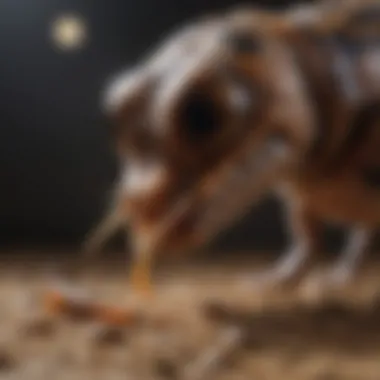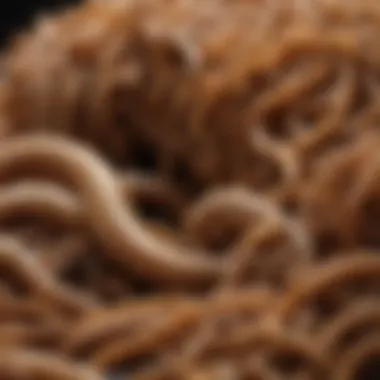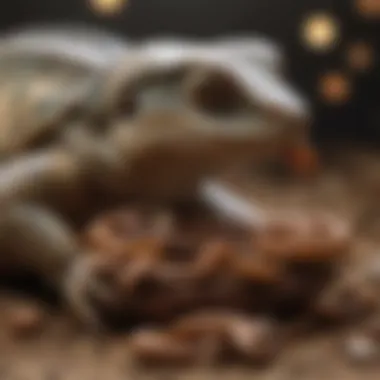Unveiling the Nutritional Advantages of Mealworms for Reptiles


Animal Species Profile
These creatures can be found in a multitude of habitats worldwide, from arid deserts to lush rainforests. Reptiles have adapted to survive in different environments, showcasing a fascinating array of natural selection at work. Their habitats play a significant role in shaping their behaviors and interactions with other species in their ecosystem.
Reptiles, despite their cold-blooded nature, exhibit diverse behaviors and social interactions. Some species are solitary creatures, only coming together during the breeding season, while others form intricate social hierarchies within their groups. Understanding the behavior of reptiles is essential in comprehending their dietary needs and preferences, including the potential benefits of mealworms in their nutrition.
Introduction
In the realm of reptile care and nutrition, the significance of incorporating mealworms into their diet cannot be overstated. These small yet mighty larvae provide a plethora of nutritional benefits essential for the well-being of various reptile species. From leopard geckos to bearded dragons, mealworms are a staple in the diet of many captive reptiles, offering a rich source of protein, vitamins, and minerals crucial for their optimal health.
Overview of Mealworms


What are Mealworms?
The key to understanding the value of mealworms lies in comprehending what they are fundamentally. Mealworms are the larvae of darkling beetles, known scientifically as Tenebrio molitor. These voracious larvae possess a high protein content along with essential nutrients needed by reptiles, making them a favored choice among reptile enthusiasts seeking to provide a balanced and nutritious diet.
Nutritional Composition
Delving into the nutritional composition of mealworms reveals a treasure trove of goodness for reptiles. These larvae are packed with protein, fats, and various vitamins and minerals that contribute to the overall health and vitality of reptiles, fulfilling their dietary requirements effectively.
Benefits for Reptiles
The benefits of mealworms for reptiles are multifaceted. Beyond their nutritional value, these larvae offer a convenient and readily available food source that supports reptiles' growth and development. Whether used as a primary food item or a supplementary treat, mealworms play a vital role in enhancing the overall health of reptiles.
Why Mealworms are Suitable for Reptiles


Digestibility
One of the key reasons mealworms are suitable for reptiles is their high digestibility. Unlike some other feeder insects, mealworms are easily digested by reptiles, ensuring efficient nutrient absorption and minimal digestive issues.
Protein Content
Another crucial aspect is the high protein content of mealworms, which is essential for the muscle growth and maintenance of reptiles. Protein serves as a building block for various bodily functions, making mealworms a valuable addition to a reptile's diet.
Calcium and Nutrient Profile
In addition to protein, mealworms also offer a significant amount of calcium, along with other essential nutrients like vitamins and minerals. These components are essential for supporting bone health, metabolic functions, and overall well-being in reptiles.


Feeding Guidelines
Frequency of Feeding
When it comes to feeding reptiles mealworms, the frequency plays a crucial role. Balancing the feeding schedule ensures that reptiles receive adequate nutrition without overfeeding or underfeeding, promoting their health and longevity.
Portion Size
Determining the appropriate portion size of mealworms is imperative to prevent obesity or malnourishment in reptiles. Understanding the ideal amount to offer based on the reptile's size and dietary needs is essential for maintaining a healthy feeding regimen.
Live vs. Dried Mealworms
Choosing between live and dried mealworms depends on various factors such as reptile preferences and convenience. Both forms offer nutritional value, but considerations like cost, shelf life, and interaction with the reptile can influence the choice between live or dried mealworms.
Supplementation
Supplementation with mealworms can bridge nutritional gaps in a reptile's diet, providing essential nutrients that may be lacking in their primary food sources. However, moderation and balance are key to prevent over-reliance on mealworms and ensure a well-rounded diet.
Stay tuned for more details in the upcoming sections to explore the diverse range of reptiles that benefit from including mealworms in their diet.







